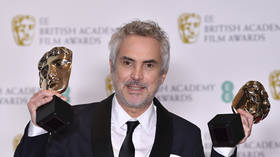BAFTA's diversity quotas want to counter hate. Instead they'll make producers & audiences hate TV

The British Film Institute has declared that TV productions must meet strict diversity requirements to be considered for its prestigious Bafta awards - but forcing "tolerance" breeds resentment and strangles artistic freedom.
The BFI has imposed a plethora of diversity quotas which signal that a show's superficial embrace of minority groups is more important than its content, staying power, or popularity with audiences. Already incorporated into the industry's film awards last year, the standards manage to insult both minority groups and the straight white masses.
Also on rt.com Female 007? Piers Morgan vows to save James Bond from PC ‘woke imbeciles’ in on-air rantTo be considered for an award, a show must meet the BFI's diversity requirements in two of four areas: onscreen cast, offscreen crew, industry access, and audience development. At least one main character should come from an "underrepresented group," along with 20 percent of secondary characters, half of whom should be female, and the main storyline (or multiple secondary storylines) should be about an underrepresented group. And heaven forbid you cast a member of that group in what could be perceived as a stereotypical role - you might as well be filming a Klan rally.
With dozens of requirements to meet within the four categories, production crews will be forced to spend a significant amount of time tailoring their scripts to fit the BFI's diversity dictates - and many are likely to resent such stifling rules. Some mandates ("significant amount of crew/staff resident in the UK outside of London and the South East of England") seem designed to make production more difficult, while others ("the target audience of a project is an underserved audience group, with a clear strategy to reach them") directly affect the subject matter.
Certain productions (an obvious example is Downton Abbey, a profoundly white period drama from a period where Britain was profoundly white) either won't get made, or will be made with the conscious awareness that they will not merit awards consideration or wide release.
Forcing tolerance down the industry's throat is likely to make producers choke. Even if they do dutifully meet all the requirements, the resentment against "diversity hires" - or members of underrepresented groups who might wrongly be viewed as diversity hires - will be palpable on set. The writer asked to change the race or sexual orientation of the protagonist, or the production crew members forced to hire a certain number of disabled employees only to end up doing the work they are physically incapable of doing, may exhibit 'tolerance' on the surface, but inside they seethe.
Such quotas actually dis-empower underrepresented groups, sowing in them the seed of doubt - were they hired because they were the best person for the job, or because the producer wants to win a Bafta? Such mistrust and suspicion can ruin a production. And the BFI's unhealthy obsession with being woke is doing a psychological number on its own employees, too.
Also on rt.com Joker filmmaker enrages 'woke culture' proponents by (accurately) blaming the tyranny of outrage for death of comedyThe BFI has put its committees and jury members through "unconscious bias" training, a program that has become a popular way for companies to burnish their progressive cred even though the "implicit association test" (IAT) on which it is based has been thoroughly discredited. Individuals who take the test are almost always told that despite what they may believe about themselves, they are, in fact, horrendously racist - instilling a profound guilt they may seek to expiate by, for example, picking Bafta winners based on the number of diversity boxes they check rather than on their artistic quality.
There's nothing wrong with wanting to be inclusive - the UK is undeniably a multicultural society, and it's to everyone's benefit that different groups get along. But strangling artistic freedom in the name of tolerance is likely to backfire in the extreme. Hollywood is losing audiences rapidly as viewers from minority and majority groups alike resent the endless churn of "woke" remakes - will Britain learn from its mistakes?
By Helen Buyniski, RT
The statements, views and opinions expressed in this column are solely those of the author and do not necessarily represent those of RT.













